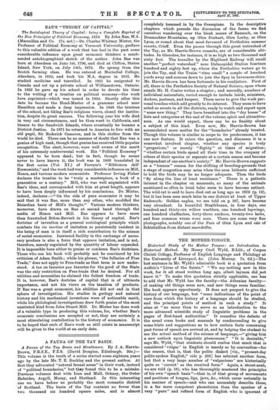RAE'S "THEORY OF CAPITAL."
' The Sociological Theory of' Capital : being a Complete Reprint of the New Principles of Political Economy, 1834. By John Rae, M.A. (Macmillan and Co. na. net.)—Dr. Charles Whitney Mister, the Professor of Political Economy at Vermont University, prefixes to this valuable edition of a work that has had in the past some considerable influence upon great economic thinkers a much- needed autobiographical sketch of the author. John Rae was born at Aberdeen on June let, 1796, and died at Clifton, Staten Island, New York, on July 14th, 1872. He sprang from the Scotch farming class. He was entered at Dfarischal College, Aberdeen, in 1810, and took his M.A. degree in 1816. He studied medicine and travelled. In 1821 he emigrated to Canada and set up a private school at Williamstown, Ontario. In 1832 he gave up his school in order to devote his time to the writing of a treatise on political economy—the work here reprinted—which was issued in 1834. Shortly after this date he became the Head-Master of a grammar school near Hamilton and made a deep impression. In 1848 the trustees of the school, not liking Rae's religious views, closed the institu- tion, despite its great success. The following year his wife died in very sad circumstances, and he then went to California, and thence to the Sandwich Islands, where eventually he became a District Justice. In 1871 he returned to America to live with an old pupil, Sir Roderick Cameron, and in this shelter from the world he died. There can be no manner of doubt that Rae was a genius of high rank, though that genius has received little popular recognition. The elect, however, were well aware of the merit of his extremely controversial work. His "Political Economy" appeared to be born dead ; but in fact,' though he seems never to have known it, the book was in 1858 translated' in the first series (Vol. XI.) of Ferrara's " Biblioteca
Economists.," and the work bad very considerable influence on Mill, Hearn, and various modern economists. Professor Irving Fisher declares the treatise to be "truly a masterpiece, a book of a generation or a century." Mill, who was well acquainted with Rae's ideas, and corresponded with him at great length, appears to have been deeply influenced by his conclusions. Dr. Mister, indeed, declares :—" On the side of pure economics it may be said that it was Rae, more than any other, who modified the Ricardian basis of Mill's thought." Various modern thinkers, moreover, have drawn on Rae at second hand through the media of Hearn and Mill. Rae appears to have more than forestalled Bohm-Bawerk in his theory of capital. Rae's doctrine of invention as a general sociological principle which combats the vie inertiae of imitation so persistently resident in the being of man is in itself a rich contribution to the science of social economics. Increased facility in the exchange of neces- sary produce is also a force that opposes imitation, and is not, therefore, merely regulated by the quantity of labour expended. It is impossible here either to praise or condemn Rae's doctrines. Those who use his book will probably not be convinced by his criticism of Adam Smith ; while his phrase, "the fallacies of Free Trade," does not apply to Free-trade as that term is now under- stood. A tax on luxuries qua luxuries for the good of the State was the only restriction on Free-trade that he desired. For all utilities and necessities he claimed the fullest freedom of trade. It is, however, Rae's doctrine of capital that is of ultimate importance, and not his views on the taxation of products. If Rae was a great economist, his abilities did not end in that sphere of investigation. His studies in geology and natural history and his mechanical inventions were of noticeable merit, while his philological investigations drew forth praise of the most unstinted kind from John Stuart Mill. Dr. Mister has done work of a valuable type in producing this volume, for, whether Rae's economic conclusions are accepted or not, they are certainly a most stimulating contribution to the history of economics. It is to be hoped that such of Rae's work as still exists in manuscript will be given to the world at an early date.


























































 Previous page
Previous page